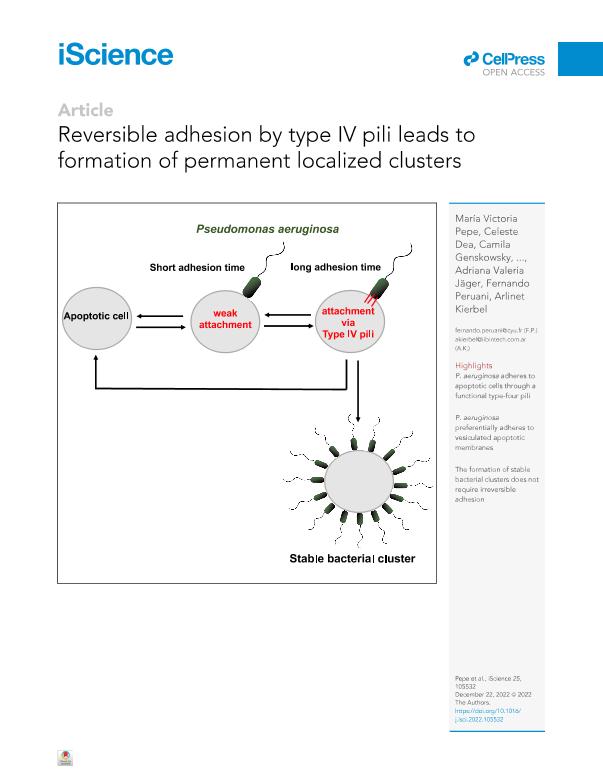Artículo
Reversible adhesion by type IV pili leads to formation of permanent localized clusters
Pepe, María Victoria ; Dea, Maria Celeste; Genskowsky Vargas, Camila Alejandra
; Dea, Maria Celeste; Genskowsky Vargas, Camila Alejandra ; Capasso, Dario Nicolás
; Capasso, Dario Nicolás ; Roset, Mara Sabrina
; Roset, Mara Sabrina ; Jager, Adriana Valeria
; Jager, Adriana Valeria ; Peruani San Román, Fernando Miguel; Kierbel, Arlinet Verónica
; Peruani San Román, Fernando Miguel; Kierbel, Arlinet Verónica
 ; Dea, Maria Celeste; Genskowsky Vargas, Camila Alejandra
; Dea, Maria Celeste; Genskowsky Vargas, Camila Alejandra ; Capasso, Dario Nicolás
; Capasso, Dario Nicolás ; Roset, Mara Sabrina
; Roset, Mara Sabrina ; Jager, Adriana Valeria
; Jager, Adriana Valeria ; Peruani San Román, Fernando Miguel; Kierbel, Arlinet Verónica
; Peruani San Román, Fernando Miguel; Kierbel, Arlinet Verónica
Fecha de publicación:
12/2022
Editorial:
Elsevier
Revista:
iScience
e-ISSN:
2589-0042
Idioma:
Inglés
Tipo de recurso:
Artículo publicado
Clasificación temática:
Resumen
The formation of long-lived, multicellular clusters is a fundamental step in the physiopathology of many disease-causing bacteria. Experiments on abiotic surfaces suggest that bacterial colonization, including initial cluster formation, requires (1) irreversible adhesion, (2) cell proliferation, and (3) a phenotypic transition. However, here we show that on infection of a polarized MDCK epithelium, Pseudomonas aeruginosa (PA) forms long-lived – i.e., permanent – bacterial clusters without requiring irreversible adhesion, cell proliferation, or a phenotypic transition. By combining experiments and a mathematical model, we reveal that the cluster formation process is mediated by type IV pili (T4P). Furthermore, we unveil how T4P quantitatively operate during adhesion, finding that it is a stochastic process that involves an activation time, requires the retraction of pili, and results in reversible attachment. We explain how such reversible attachment process leads to the formation of permanent bacterial clusters and quantify the cluster growth dynamics.
Palabras clave:
CELL BIOLOGY
,
MATHEMATICAL BIOSCIENCES
,
MICROBIOLOGY
Archivos asociados
Licencia
Identificadores
Colecciones
Articulos (IIBIO)
Articulos de INSTITUTO DE INVESTIGACIONES BIOTECNOLOGICAS
Articulos de INSTITUTO DE INVESTIGACIONES BIOTECNOLOGICAS
Citación
Pepe, María Victoria; Dea, Maria Celeste; Genskowsky Vargas, Camila Alejandra; Capasso, Dario Nicolás; Roset, Mara Sabrina; et al.; Reversible adhesion by type IV pili leads to formation of permanent localized clusters; Elsevier; iScience; 25; 12; 12-2022; 1-16
Compartir
Altmétricas



